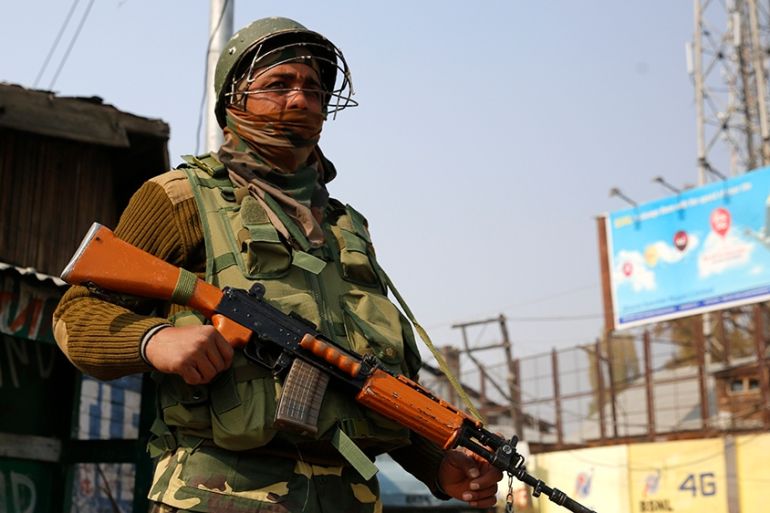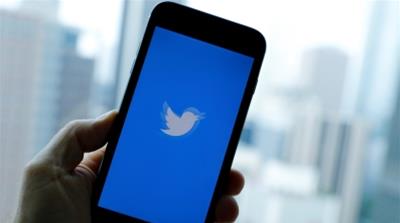Twitter accused of censoring free speech in Kashmir
Activists and journalists allege the micro-blogging site is ‘part of the censorship imposed by the Indian government’.

Srinagar, Indian-administered Kashmir – Rights activists have raised concerns over the removal of hundreds of thousands of tweets, many of them belonging to journalists critical of the Indian government’s policy on Indian-administered Kashmir.
The micro-blogging site has been accused of suppressing freedom of expression in Kashmir after a study by the media watchdog, Committee to Protect Journalists (CPJ), revealed that nearly one million tweets have been removed since 2017.
Keep reading
list of 2 itemsWhy was Indian-administered Kashmir’s status revoked?
More accounts were withheld in India in the second half of 2018 than in the rest of the world combined, according to Twitter’s transparency reports.
Kashmir-based human rights activist Khurram Parvez said Twitter’s suspension of Kashmiri accounts was in sync with the temperament of the government in Kashmir, which frequently orders the shutdown of the internet.
“Dissent is being criminalised and space is stifled. This way, Twitter is automatically siding with the oppression and not with the expression. This is the violation of right to freedom of speech,” he told Al Jazeera.
The Muslim-majority region has been under a security lockdown and near-total communication blackout since August 5, when New Delhi scrapped Article 370 of the constitution, which granted Kashmir a measure of autonomy.
Lengthy internet suspension
Though curbs on mobile phones have been partially lifted, the internet remains suspended – making it one of the lengthiest internet suspensions in the Himalayan region contested by both India and Pakistan, who each rule part of the disputed region.
Akar Patel, South Asia director of Amnesty International, called Twitter’s action a “fundamental deprivation of freedom of expression”.
In recent years, as internet penetration deepened in Kashmir, social media, including Twitter, became a favoured mode of expressing opinions. The region’s government has frequently ordered internet shutdowns on the grounds that it was being used to incite protests.
The latest internet suspension in Kashmir, which will have gone on for three months later this week, has affected the dissemination of information as well as e-commerce and businesses in the region.
Parvez, the human rights activist, said many people in Kashmir tweet to express dissent against the government.
“Where will people express themselves? If they protest on the street they will be criminalised and now they cannot even do it in the virtual world,” he said.
The CPJ report, published on October 24, revealed that the content, which was blocked under Twitter’s country withheld content policy, had mainly focused on Kashmir.
“Among dozens of accounts that were withheld, CPJ identified several besides @KashmirNarrator that were sharing news and opinion, raising serious questions about what safeguards are in place to ensure freedom of the press and the free flow of information,” read the report published on CPJ’s website.
Self-censorship
After the complete lockdown in Kashmir on August 5, Ahmad, a media researcher based in New Delhi, tweeted several SOS messages from his account about the region’s precarious security situation.
His account was suspended and a message displayed on his twitter handle read that “the account had violated Twitter rules”.
|
|
“I had shared many stories about Kashmir and tagged the global human rights bodies like United Nations, Amnesty International and many others,” the 29-year-old told Al Jazeera.
According to Ahmad, it was only after he deleted nearly a dozen tweets about Kashmir that his account was restored.
“My account was not restored until I was forced to delete those tweets. The message continued to display that the said tweets are against their so-called policy,” he said, adding that now he self-censors before tweeting anything, particularly about the Kashmir situation.

Ahmad, who identified himself by one name due to security concerns, alleged that “Twitter is choking our right and the space to talk about Kashmir siege”.
“It has become difficult and unsafe now to even put your thoughts on Twitter, which claims to be a platform endorsing freedom of speech. You cannot even talk about human rights violations.”
A screenshot Ahmad shared with Al Jazeera showed his disabled account with a message: “We have determined that the account violated the Twitter rules. As a result, we have locked your account”.
‘Curbs on the freedom of speech’
Faisal Khan, a 30-year-old photojournalist who works with Anadolu news agency, told Al Jazeera “censorship is not new”.
“In 2016, I had shared the picture of the graffiti that praised a rebel commander and Twitter suspended my account,” he told Al Jazeera, adding that in July 2017, his account was again suspended twice for tweeting pictures.
Khan’s account was blocked again on September 8, 2017, when he shared a picture of a gun-wielding policeman chasing a student protester with a school bag on his back.
“I wrote to Twitter, they did not help and I volunteered to delete the pictures,” he said. “I had no other option,” he said.
Khan said Twitter’s move was a curb on “freedom of speech and control on the free flow of information”.
“As a journalist, I show through my pictures what I see without any bias but Twitter suspended my account without detailing the specific cause of objections in my pictures.”
Another Kashmiri journalist, Masrat Zahra, also alleged that her picture was censored by Twitter.
“One of my picture of religious mourner carrying the picture of a rebel commander was blocked by Twitter and Instagram on the vague reasons of violations,” the 25-year-old photojournalist said.
The censorship of content on Twitter has spiked since 2017 – nearly two years before New Delhi’s Kashmir move – raising concerns among people advocating free speech in India.
Geeta Sesu, the co-founder of FreeSpeech Collective, an advocacy group for freedom of speech based in New Delhi, told Al Jazeera that “the actions of Twitter were completely wrong and disturbing”.
“Twitter is supposed to be a democratic space and it is supposed to be transparent about why some accounts are being withheld and what content in them is objectionable,” she said.
“If Twitter does it, it cuts the people of space and robs them of a platform to discuss and debate. It is regrettable that Twitter is part of the censorship imposed by the Indian government on the ordinary citizens.”
‘No one above our rules‘
When asked about the blocking of Twitter accounts in Kashmir on the request of security agencies, the region’s police chief, Dilbagh Singh, told Al Jazeera that “he has no idea about it”.
However, another top official, who spoke on the conditions of anonymity, admitted that they “were getting accounts of Twitter handles blocked for sharing anti-national content”.
Supporters of Prime Minister Narendra Modi’s Hindu nationalist government have often dubbed critics and opposition leaders as “anti-nationals”.
“After identifying the Twitter handles, a request is made through a magistrate for their blocking. After getting a proper court order same is sent to Computer Emergency Response Team (CERT), an expert agency that handles computer security incidents,” the official said.
The official said CERT, in liaison with social media platforms, checks the “merit of the accounts that are requested to be blocked”.
“It’s mostly the accounts with anti-national content and sometimes blasphemous handles also”.
He, however, did not explain “blasphemous” content since India does not have a blasphemy law.
“It totally makes sense the Indian government would go after Twitter and Twitter users, because Twitter as a platform is a really significant source of information sharing, for journalists and activists and regular citizens in Kashmir,” David Kaye, the UN special rapporteur for freedom of opinion and expression, told CPJ.
In its response to the allegation, a Twitter spokesperson said in an emailed statement to Al Jazeera: “At Twitter, no one is above our rules.”
“We enforce our policies judiciously and impartially for all users-regardless of their political beliefs and background. With regards to official legal requests we are compelled to comply with under Indian law.”
“We publish actions taken twice a year in the Twitter Transparency Report for purposes of public awareness and disclosure.” the statement said.